
The National Association of Realtors’ legal settlement upends the traditional model of sellers paying for the buyer’s agent in a home purchase.
The agreement has the potential to save home sellers billions of dollars every year, but could also complicate purchases for buyers.
The NAR, the largest trade group representing residential real estate agents, agreed to pay $418 million over four years to settle claims that the group and its members engaged in uncompetitive practices that forced sellers to compensate agents who brought buyers to the closing table.
“There are valid positions on both sides, and this is the way the game has been played,” said Mark Lee Levine, a professor at the Burns School of Real Estate and Construction Management at the University of Denver who has tracked the issue closely.
Starting in July, the game will be played differently. Buyers can no longer count on sellers paying the agents representing them, Levine said. On a $600,000 home, that could shift around $15,000 to $18,000 in typical commission costs back to the buyer.
Commissions on a home sale are, in theory, completely negotiable, but they typically run in the 5% to 6% range. How commissions get split can vary, but sellers almost always pay the buyer’s agent via what is known as a cooperative compensation model or co-op.
What a seller was willing to pay was communicated on the multiple-listing service or MLS controlled by local Realtor associations. If the compensation was too low or non-existent, buyer agents would pass on showing a home, plaintiffs in a case known as Sitzer-Burnett argued.
Listing the buyer agent compensation is now prohibited as part of the settlement. Buyers still have the right to push for a lower commission, as was the case before. But if they know they are footing the bill, they may be much more motivated to do so.
“For far too long, home sellers have faced a system recognized by many as blatantly unfair. Individual sellers often feel powerless to negotiate a better deal for themselves given the risk that offering lower commissions will cause brokers to steer buyers to other properties,” Robert Braun, a partner in Cohen Milstein’s Antitrust practice, and one of the attorneys that led the case against NAR said in a statement.
Technology has lowered or eliminated commissions across wide parts of the economy, from stock brokerages to travel agencies. But they largely remained unassailable in real estate until a jury ruled against the industry last year. A series of settlements have followed that ruling.
Although the heavy weight of litigation in the Sitzer case has been lifted, what comes next is uncertain.
Will sellers and buyers, aided by cost-saving technology, push to lower some of the highest real estate transaction costs in the developed world? Will the real estate brokerage industry, already struggling from higher interest rates, suffer another steep drop in revenues, forcing tens of thousands of agents out of the field? Will buyers get a break via lower home prices to cover their added costs, or will sellers pocket the savings, leaving buyers in the lurch?
“NAR has worked hard for years to resolve this litigation in a manner that benefits our members and American consumers. It has always been our goal to preserve consumer choice and protect our members to the greatest extent possible. This settlement achieves both of those goals,” said Nykia Wright, NAR’s interim CEO in a release.
Listing agents and buyer agents can still communicate directly about commissions and sellers can still pick up those costs. Sellers might do that if they think it will generate more interest in their listings or set them apart. But not every seller will agree, and a buyer may be set on owning that house.
That is where things get more complicated. The agreement a buyer has signed with the agent will then leave the bill for services rendered on the buyer’s table. Buyers, already stretched to come up with down payments and escrow costs, not to mention elevated home prices, may lack the funds, killing a deal. Or their agents might agree to take a smaller cut.
“We shouldn’t have been fighting over the commissions. We should have been fighting to serve our customers better,” said Bret Weinstein, founder of Guide Realty in Glendale.
Weinstein said becoming a real estate agent comes with a low bar of entry. Most who get in do a minimal number of transactions, if any, in a given year. And horror tales abound of unaware consumers in the hands of unskilled agents.
“It will shake up the industry,” he said of the changes coming. “One day there will be an exodus of people leaving.”
Buyer agents who remain will pursue different models, he predicted. One camp will offer high-level service from skilled negotiators who can justify their costs. That is one reason top-performing agents aren’t fearful of what comes next, he said.
At the other end will be agents offering a lower level of services in return for discounted commissions. Expect more technology firms to emerge that will try to automate the buying process or lower costs in other ways.
Levine offers another scenario, one where consumers continue to do the legwork in researching neighborhoods and finding a place through online resources. They negotiate terms or hire someone to do that. Then a real estate lawyer is brought in to handle the contract and closing. The costs would be lower and the approach might appeal to repeat buyers.
“As of July that co-op is going away. There is no guarantee that a buyer’s agent will get paid,” Weinstein said.
It will be a brave new word for consumers and the real estate industry alike.
2024 economic forecasts
Chapman: ‘Very slow growth. No recession’
CS Fullerton: ‘Cracks’ will widen to a mild recession in late 2024
US Realtors: Housing rebound from 2023’s dismal sales
California Realtors: Rising prices, sales in 2024
